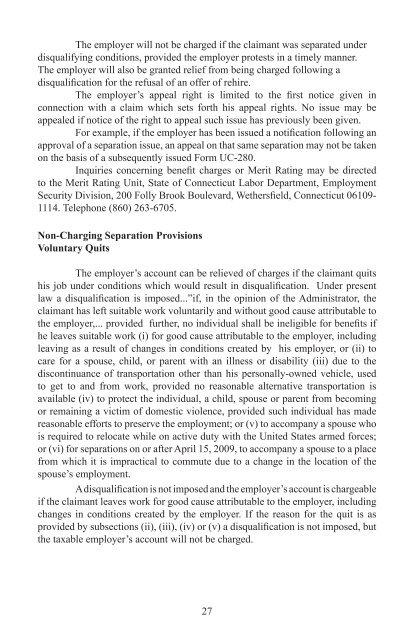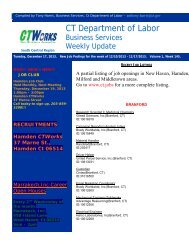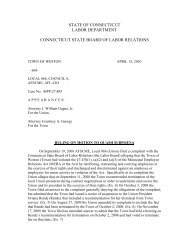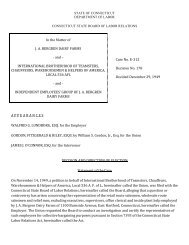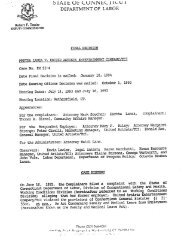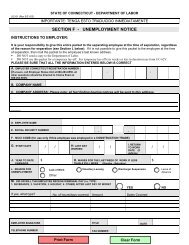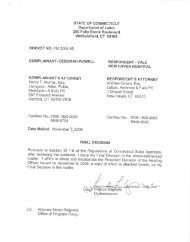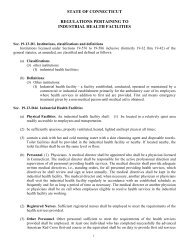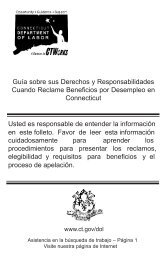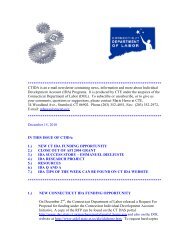Employer's Guide to Unemployment Compensation - Connecticut ...
Employer's Guide to Unemployment Compensation - Connecticut ...
Employer's Guide to Unemployment Compensation - Connecticut ...
You also want an ePaper? Increase the reach of your titles
YUMPU automatically turns print PDFs into web optimized ePapers that Google loves.
The employer will not be charged if the claimant was separated under<br />
disqualifying conditions, provided the employer protests in a timely manner.<br />
The employer will also be granted relief from being charged following a<br />
disqualification for the refusal of an offer of rehire.<br />
The employer’s appeal right is limited <strong>to</strong> the first notice given in<br />
connection with a claim which sets forth his appeal rights. No issue may be<br />
appealed if notice of the right <strong>to</strong> appeal such issue has previously been given.<br />
For example, if the employer has been issued a notification following an<br />
approval of a separation issue, an appeal on that same separation may not be taken<br />
on the basis of a subsequently issued Form UC-280.<br />
Inquiries concerning benefit charges or Merit Rating may be directed<br />
<strong>to</strong> the Merit Rating Unit, State of <strong>Connecticut</strong> Labor Department, Employment<br />
Security Division, 200 Folly Brook Boulevard, Wethersfield, <strong>Connecticut</strong> 06109-<br />
1114. Telephone (860) 263-6705.<br />
Non-Charging Separation Provisions<br />
Voluntary Quits<br />
The employer’s account can be relieved of charges if the claimant quits<br />
his job under conditions which would result in disqualification. Under present<br />
law a disqualification is imposed...”if, in the opinion of the Administra<strong>to</strong>r, the<br />
claimant has left suitable work voluntarily and without good cause attributable <strong>to</strong><br />
the employer,... provided further, no individual shall be ineligible for benefits if<br />
he leaves suitable work (i) for good cause attributable <strong>to</strong> the employer, including<br />
leaving as a result of changes in conditions created by his employer, or (ii) <strong>to</strong><br />
care for a spouse, child, or parent with an illness or disability (iii) due <strong>to</strong> the<br />
discontinuance of transportation other than his personally-owned vehicle, used<br />
<strong>to</strong> get <strong>to</strong> and from work, provided no reasonable alternative transportation is<br />
available (iv) <strong>to</strong> protect the individual, a child, spouse or parent from becoming<br />
or remaining a victim of domestic violence, provided such individual has made<br />
reasonable efforts <strong>to</strong> preserve the employment; or (v) <strong>to</strong> accompany a spouse who<br />
is required <strong>to</strong> relocate while on active duty with the United States armed forces;<br />
or (vi) for separations on or after April 15, 2009, <strong>to</strong> accompany a spouse <strong>to</strong> a place<br />
from which it is impractical <strong>to</strong> commute due <strong>to</strong> a change in the location of the<br />
spouse’s employment.<br />
A disqualification is not imposed and the employer’s account is chargeable<br />
if the claimant leaves work for good cause attributable <strong>to</strong> the employer, including<br />
changes in conditions created by the employer. If the reason for the quit is as<br />
provided by subsections (ii), (iii), (iv) or (v) a disqualification is not imposed, but<br />
the taxable employer’s account will not be charged.<br />
27


